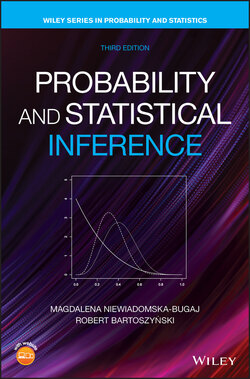Читать книгу Probability and Statistical Inference - Robert Bartoszynski - Страница 66
Problems
Оглавление1 2.7.1 Peter and Tom attend the same college. One day Tom buys a ticket for a rock concert. Tickets are already sold out and are in great demand. Peter, who does not have a ticket, agrees to play the following game with Tom. For a fee of $25, Peter will toss a coin three times and receive the ticket if all tosses show up heads. Otherwise, for an additional fee of $50, Peter will toss a coin two more times and receive the ticket if both tosses show up heads. If not, then for an additional fee of $100, Peter will toss a coin and receive the ticket if the toss shows up heads. Otherwise, all money will be given to Tom, and he also will keep the ticket. Assuming that the coin is fair, subjective probabilities of various outcomes coincide with objective probabilities, and that Peter's utility is linear in money, show that Peter's utility of the ticket exceeds $200.
2 2.7.2 Refer to Problem 2.7.1. Tom would agree on the following conditions: Peter pays him $50 and tosses a coin, winning the ticket if it comes up heads, and otherwise losing $50. In such a situation, should they both agree that Peter buys the ticket from Tom for $150?
3 2.7.3 Suppose that Tom is confronted with the choice between two options: , which is simply to receive $1,000,000, or , which is to receive $5,000,000 with probability 0.1, receive $1,000,000 with probability 0.89, and receive $0 with the remaining probability 0.01. After some deliberation, Tom decides that is better, mostly because the outcome $0, unlikely as it may be, is very unattractive.Tom is also confronted with a choice between two other options, and . In , he would receive $5,000,000 with probability 0.1 and $0 with probability 0.9. In , he would receive $1,000,000 with probability 0.11 and $0 with probability 0.89. Here Tom prefers : the “unattractive” option $0 has about the same probability in both and , while the positive outcome, although slightly less probable under , is much more desirable in that in . Show that these preferences of Tom are not compatible with the assumption that he has utilities and of $5,000,000, $1,000,000, and $0, such that (This is known as Allais' paradox; Allais, 1953).
